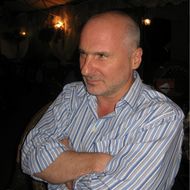- A
- A
- A
- ABC
- ABC
- ABC
- А
- А
- А
- А
- А
- HSE Campus in St. Petersburg
- School of Arts and Humanities
- Department of History
- News
- "Boundaries of History" - Nikolai Ssorin-Chaikov: "Two Lenins: a brief anthropology of time"
-
Department
-
Educational programmes
Address:
190068 Saint Petersburg
123 Griboedov channel, Room 123
Phone:+7 (812)786-92-49
Postal address:
190068 Saint Petersburg
123 Griboedov channel
The Department of History was created in 2012. The overarching goal of the department is systematic development of the field of global, comparative, and transnational history as a potent tool of overcoming the limitations of national history canon, fostering interdisciplinary dialogue in the field of social sciences and humanities, and brining new public relevance to historical knowledge. The department mission includes the development of new type of historical undergraduate and graduate education in Russia and pioneering new research fields in Russian historiography in dialogue with the global historical profession.
 Social History of the True Orthodox Christians Wandering in Russia. Capitalism, Communism, and Apocalypse, 1900-1930
Social History of the True Orthodox Christians Wandering in Russia. Capitalism, Communism, and Apocalypse, 1900-1930
L.; NY: Routledge, 2025.
Chukcheeva M.
Nineteenth-Century Art Worldwide. 2025. Vol. 24. No. 3. P. 246-254.
In bk.: Women, Gender, and Technosciences, 1900–2020. A Beard to Govern. Routledge, 2025. Ch. 7. P. 123-140.
Khvalkov E., Levin F., Кузнецова А. Д.
Working Papers of Humanities. WP. Издательский дом НИУ ВШЭ, 2021

"Boundaries of History" - Nikolai Ssorin-Chaikov: "Two Lenins: a brief anthropology of time"
Nikolai substantiates his theoretical study with fascinating ethnographic and historical material about the two Lenin: the first is the famous Soviet leader of the early twentieth century, and the second is the hunter of the Tungus, nicknamed "Lenin," who experienced the collapse of the USSR in the 1990s. In his intertwined stories, Ssorin-Chaikov reveals new dimensions of ethnographic reality, multiplying our notions of time.
The author begins his presentation not with the presentation of Lenin, but with an auxiliary figure, through which he acquaints us with the Soviet realities of the 1920s. Thus, he pays special attention to the American businessman Armand Hummer who came to provide all possible assistance in the form of pharmacological means required in the period of famine. The businessman offers a way of exchanging grain for the Ural riches, this method is not considered as an exchange, Ssorin-Chaikov calls it - a gift. First of all, Hummer gives away as a gift - time. The saved time leads to the preservation of life. We see that the gift of time becomes one of the most precious gifts, for which the businessman receives a return gift, already from Lenin.
Nikolai claims that the importance of the memoirs of a businessman is also in the appearance of the narrative of time itself. The author identifies the main categories of temporality on which part of the work is built. We trace the ecological, mythological temporality, the temporality of the civil war, as well as expectations and trade.
In another part of the work, the author acquaints us with the category of time represented by the eyes of the Evenks, namely the hunter named "Lenin", the gap between the two heroes more than half a century. Demonstrating a different perception of time, Nikolai comes to the conclusion that the two Lenin are two different ways of showing what one time does for another. One time creates a classification for another time.
Ssorin-Chaikov deduces readers beyond a simple global history or intertemporal comparison, instead uses these two figures to accept an ethnographic study of the very category of time that we use to overcome various historical contexts.
Associate Professor
Report:

Assistant


